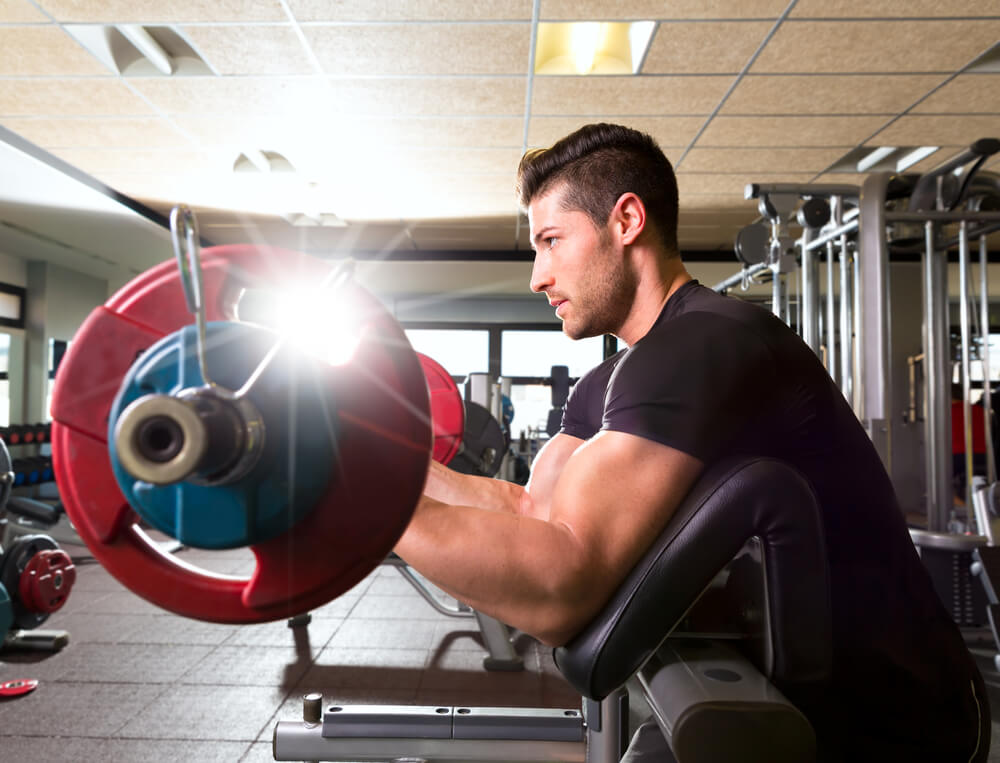
This post is more for the advanced readers (and trainers) of this blog…
Recently my buddy Justin who helps me with the filming and technical aspects of Gym Junkies stumbled upon a training movement that’s gaining a lot of ground called “Bio-Feedback Training”. The rest of this post is written by him, so I’ll let him take over from here…
Bio Feedback Training…
About 4 weeks ago, a friend of mine recommended checking out some videos by Adam Glass. Adam does strongman/grip training and is also a well-respected strength coach.
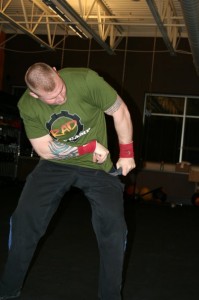
When I checked out his stuff, I was a bit hesitant and thought it might have been some “new age” crap, but the more I dove into the training methods, and tested them for myself, I realized this could possibly be one of the biggest breakthroughs in training in a long time.
I talked a little bit with my buddy Dave, who had been doing Adam’s Bio Feedback Program for the past 3 months, and was frankly blown away by the results he was seeing.
Dave is a pretty advanced lifter (Deadlift of 450 at 175 lb bodyweight) and said he had significantly upped all of his lifts, packed on about 15 lbs of muscle and was hitting PR’s every day in the span of 3 months!
Alright, I was sold…So I decided to give it a try…
I’ve been at it for about 3 weeks now, and can already see noticeable differences in my strength and I’ve added about 4 lbs of muscle in those 3 weeks. I actually think I’ve lost a bit of fat as well (haven’t measured) and can see a slight difference in my ab area.
I used to be sore all the time after workouts but haven’t really had that happen since starting the Bio Feedback training.
How Bio Feedback Training Works
Here’s the nuts and bolts of it…
Basically depending on how your body feels that day, certain exercises are going to give you better results than others.
So before your workout, you take 1-2 minutes and test a few different exercises depending on your goals. So if my goal is to up my deadlift, I will test deadlifts, front squats, sumo deadlifts and maybe one more…
Now to test the movements all you need to do is check your range of motion by bending over to touch your toes. Instead of explaining it all to you – you can just watch this video of Charles Bustos doing his testing. He’s one of the guys doing the Bio Feedback program right now
As you can see, depending on which exercise you do your body responds in totally different ways. The whole idea behind it is that when you’re doing exercises that test well – your results will improve each and every workout.
Like I said, I’ve been doing this for 3 weeks, and I’m seeing some incredible results already. I was previously doing Bill Starr’s 5×5 program and was kind of hitting a wall. Since starting this, I’ve built 4 lbs of muscle, lost some fat, and haven’t been horribly sore like I usually am. I had a nagging little lower back injury as well that seems to “miraculously” started going away (who knows it could all be in my head :).
I highly suggest you check out Adam’s site right now. He has a free video up, explaining the bio feedback training and how you can incorporate it into your simple workout plan. And if you’re a trainer or coach, you should definitely check this out as a way to help your clients get better results… I don’t know how long the video will be up for, so check it out while you can!
– Justin
Latest posts by Terry M (see all)
- Garage Gyms - Aug 1, 2018
- Kettlebells – Why They Should Be Added To Your Routine. - Jul 24, 2018
- Weight Belts: What Are They Really For? - May 31, 2018



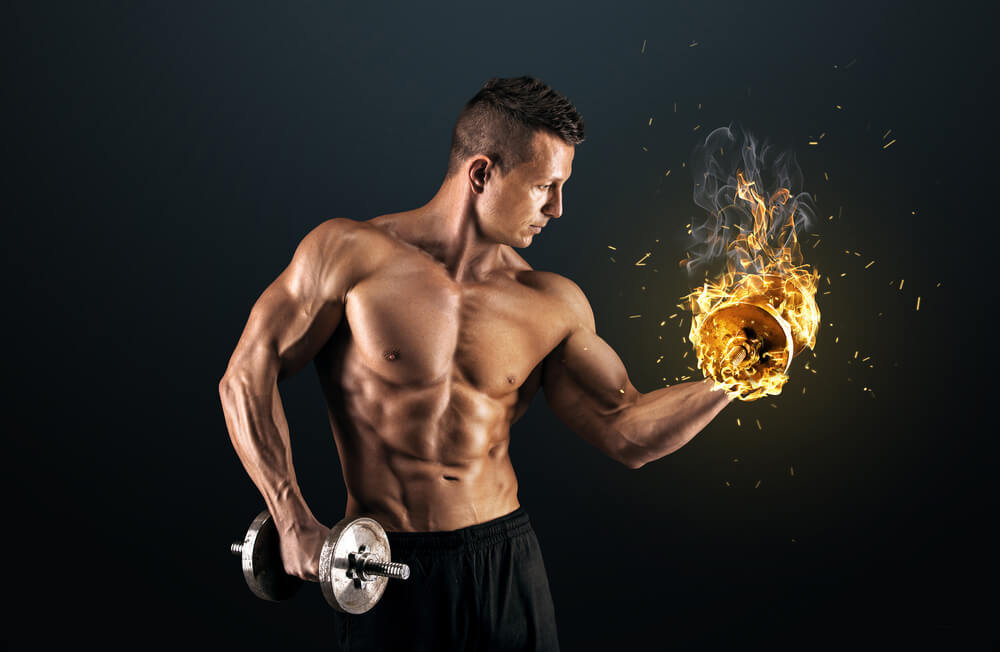

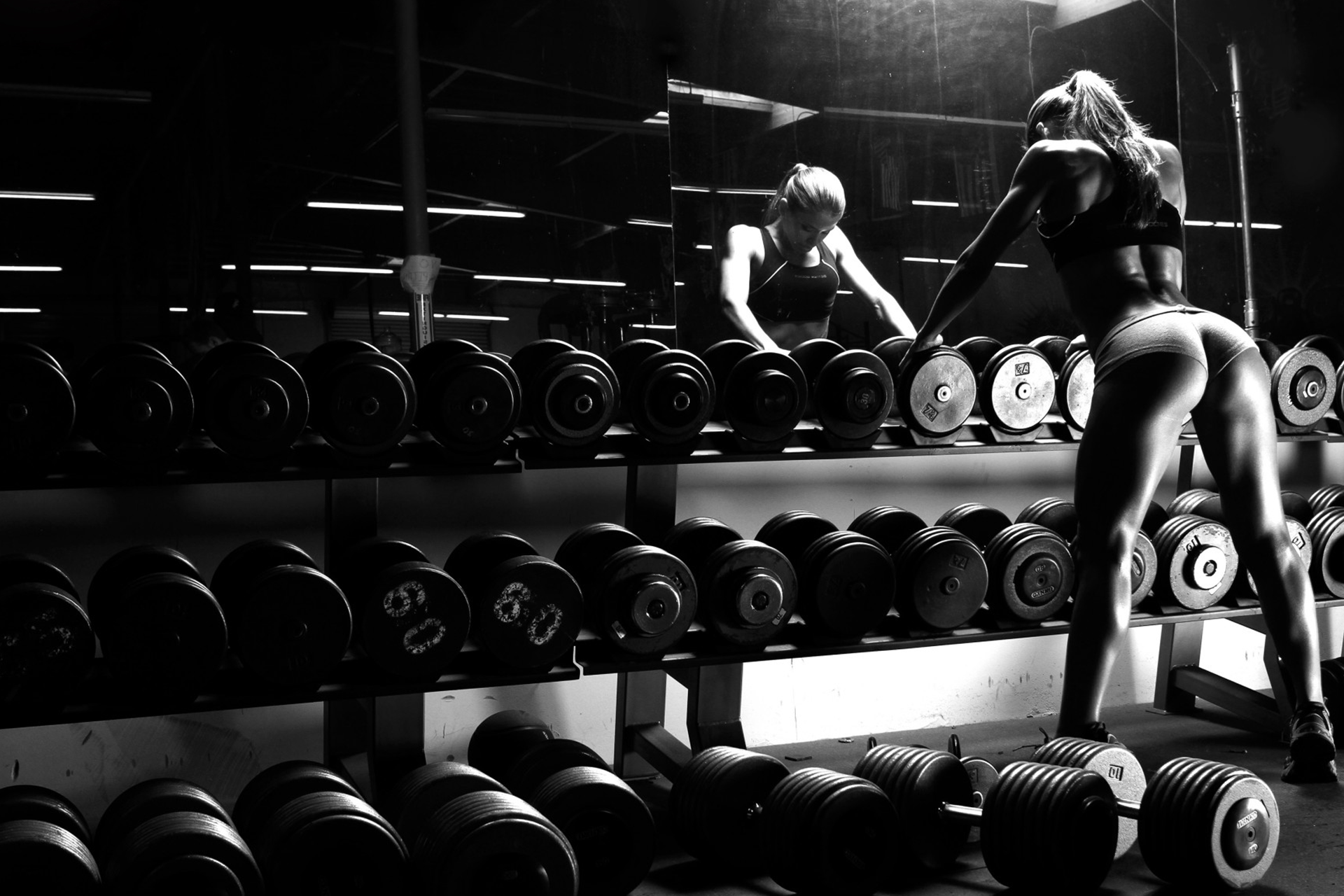
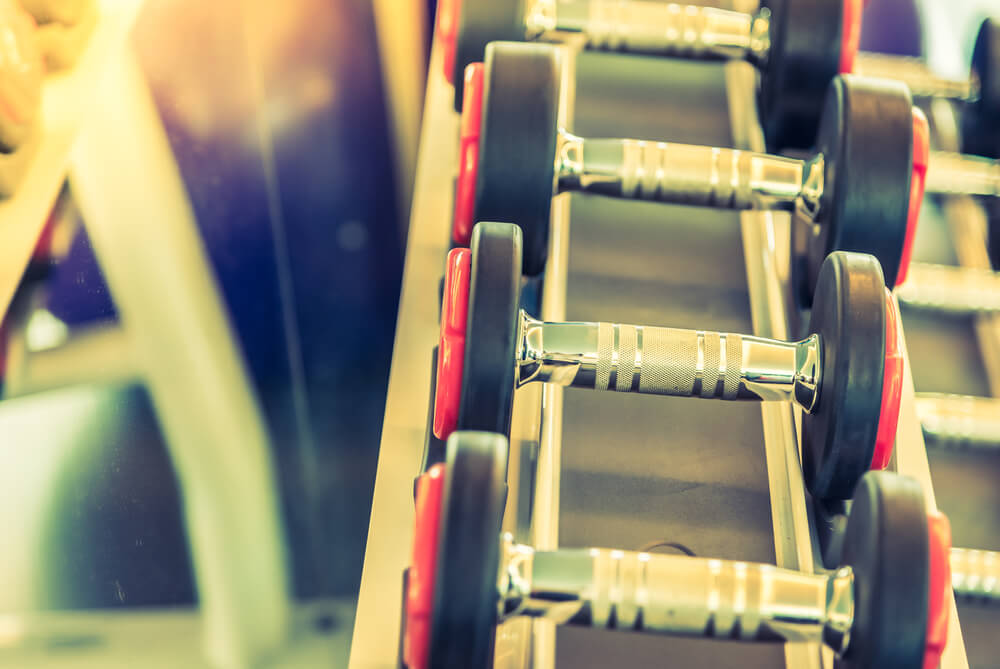

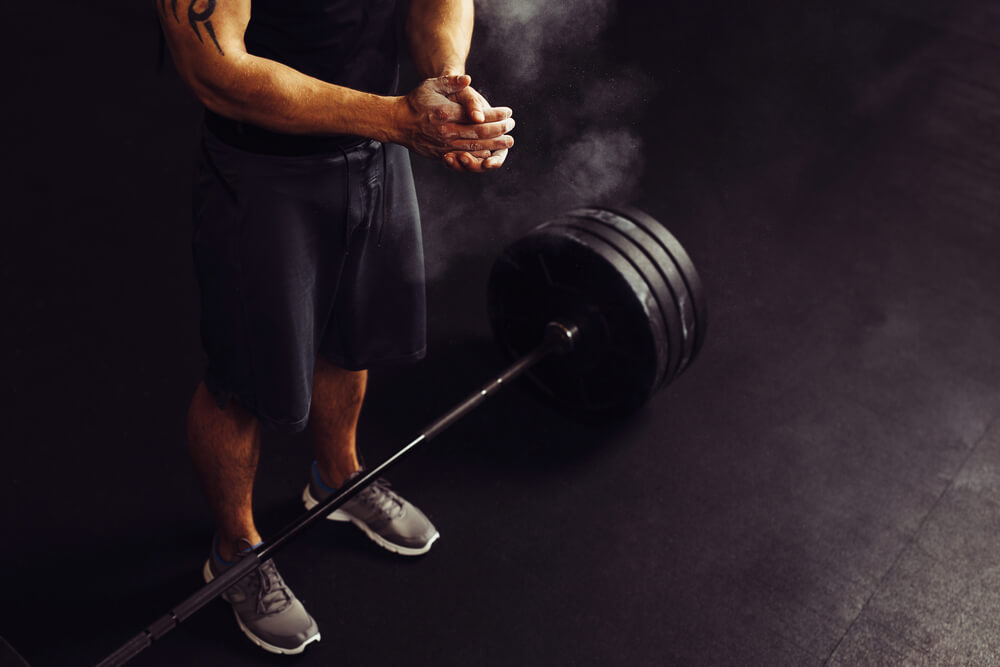



If I hadn’t tried it, I’d probably never believe it. Now I am accustomed to making huge gains day after day, never being sore, and my chronic shoulder issue has evaporated. This is the future, make no mistake.
Great post Vic!
Vic, thanks for sharing great resource. As a health and nutrition coach I’ve learnt to accept challenges so you can feel the exhilaration of victory.
This system sounds really innovative and interesting but I’m still unsure in what context someone would use it. I also have a few questions about the described method:
What if the same exercises test the same and make you more flexible everytime you do them everyday? Obviously you shouldn’t choose deadlifts over Bench Press everyday.
What does it even matter if an exercise makes you more flexible at touching your toes???
If anyone could shed any light on this it would be sweet.
Basically you want to do the exercises that test the best and are in line with your goals.
So if your goal is to put on more muscle then big compound movements would be right for you. If your goal is to up your deadlift, then deadlift variations and similar lifts that will improve yoru DL should be tested.
If an exercise tests really well continually you should definitely keep doing it. Ive done wide grip pull ups for the past 3 weeks every workout because it continues to test well.
Basically your body responds better to exercises that are right for you that day – thats why the increase in ROM
If you subscribe to the video ADam has up on his site, he said hes gonna do at least 1 more explaining it more.
Hey Vic, I dunno about bio feedback. I guess if it comes from RKC there’s something to it – I really respect pavel and think he’s an excellent strength specialist. However, the way I see it, I think it all has to do with sufficient warming up. The guy managed to increase his range of motion as his back got more and more primed to doing the workout. As for results, as you warmup better, your neuromuscular activity would also invariably increase. More muscles would be recruited and your nerves can fire more effectively. That may be the reason for your gains. I don’t believe incorporating something is a primary movement would actually do more than another movement. If you’re weaker at an exercise, you should train it, no? And as you get stronger at that movement, you would begin to recruit your muscle fibres more effectively as well as your body recognizes it. That would also stimulate you to make the most gains! Of course, an exercise you’re proficient in (I’m guessing the guy in the video is proficient in the rows or neutral grip pullup instead of pullups or chinups), your body would respond favourably to it. But bottom line for me is: the better you become at a movement, the more your body would respond to it. Biofeedback should be replaced by getting better in your weaker movements.
But overall, great work, Vic. Keep ’em comin’!
Actually even if your warmed up, an exercise that doesnt respond well to your body will not test well.
So yoru ROM could increase greatly with a quat, and then you do a pull up and it actually decreases 5-6 inches…
I did the how low can you go test last night. first i stopped at my lower shins. Then i stretched again and I was a little lower. Then another stretch and still lower. What i am saying is that I got lower each time because i was stretching! Not sure if i buy that doing a pull-up will help anymore than just stretching another time. Seems the stretching is increasing the distance i can stretch.
try it with exercises that dont use the legs.
For me currently, regular pullups and chinups test like shit and my range of motion is terrible, but when I do them on the rings they test really well.
Same with shoulder presses. Barbell presses dont test well at all, but dumbbell presses test really well
You’re correct, what you proved is that stretching is a positive movement for you and increases your range of motion. Had you smashed your hand with a tack hammer instead of stretching, you would have seen a decrease in range of motion.
The intention is not to see how low you can go. The intention is to TEST how your body responds to the movement. You STOP when you feel tension.
Try this with 5 major movements and you will see a difference. Try a squat, deadlift, pull-up, row, and press.
ALL of the people using this system are getting results that are unobtainable with any other method. Try it and you can be one of them.
I understand what your point is meant to be here, WC, but it’s also irrelevant. I don’t mean to be disrespectful, but that’s what it is.
Testing is primarily used to define which movements that logically aid your fitness/movement/body comp goals will be most efficient/effective at that time.
Is your goal being able to use tension to touch your palms to the floor? Because all you are proving is that stretching allows you to stretch further. If your goal is something like a higher vertical jump, would you want to stretch to aim for that? No? Then you wouldn’t test stretching at all in your workout.
That’s my 2 cents anyway.
Justin and david, I’m glad you guys are here fighting the good fight.
What all the naysayers like to do is provide endless “reasons” why this works, like warmed-up muslces and primed neuromuscular receptors.
My advice is to go out and actually TRY this stuff. Being warmed up has nothing to do with your range of motion. I typically try to get 4 different lifts in each session. My ROM motion varies after each different exercise, well after I’m “warmed-up”.
Also, if your body is telling you to do deadlifts for 2 weeks straight, chances are, your deadlift probably WAS a weak point. This is your body’s way of telling you to work on it!
Lastly, I think it’s comical that people are willing to dismiss ideas based solely on where they come from. There’s a ton of good information out there. Just because it’s not put out by NSCA, NASM, or RKC doesn’t mean it has no merit.
Anyways, go try it. I DARE you.
What if you can get you hands flat on the ground. I’ve been doing yoga for a couple years and I am already very flexible. How would I go about testing myself using this method.
Greg, this is Justin who wrote the post…
Basically you want to jsut casually bend over until you reach tension. Most people can MAKE themselves touch the ground with a little effort.
So just casually bend over and dont force yourself to touch the ground and test from there